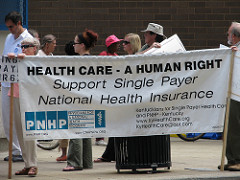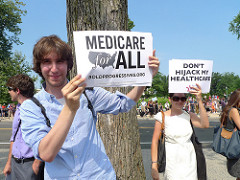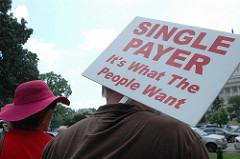 |
 |
 |
 |
 |
Every plan to save or improve health care is just another form of monopolistic defense. If health care markets worked well, there would be no need to regulate.
Insurance helps negate the high prices that health monopolies charge. When hospitals charge outrageous prices that are way too high, people desperately want a discount.
Insurance allows people to pool their money so that they have some way to negotiate pricing with the hospitals. The net effect is that the insurance company and the patient share the benefits of the arrangement.
You can tell there is no competition when prices are not even given out. Asymmetrical information is one of the main problems with health care.
In a competitive market, those that didn’t give awesome service and good pricing would go out of business. The bizarre world of health care is only because they feel so powerful that they don’t have to play fairly.Government has now stepped in and started to force health care to reveal their pricing. The government has had the information for a long time through Medicare, they just weren’t releasing the information. Pressure is mounting as some states and some grass roots movements are making inroads into the transparency issue.
There are a lot of grass roots movements for a single-payer system. However, they have a difficult time making progress compared with the billions each year spent on lobbying congress from health care companies.
So far, there hasn’t been much of a defense against lobbying. And, since the Citizens United decision to let a corporation be a person the problem has simply got much worse.The government uses price controls in Medicare and Medicaid. They set aside a huge chunk of money and then let the AMA decide how much they want to get paid for each service. It’s an indirect type of price control. These price controls are considered fair and are the baseline that insurance companies use to set their own prices which are always much higher.
Some physicians don’t take Medicare and Medicaid because they want a higher profit. Choices are restricted on these programs. It is important to note that a single-payer system would solve this problem.
There are thousands of other laws attempting to fix these problems. So far, these laws haven’t helped much. The insurance, drug, AMA, and hospitals are very effective at keeping any legislation weak (at best). It turns out that the government is too weak to withstand this ultimate monopoly.
The real problem is the monopoly power that health care companies have. If real competition were induced, these things might fix themselves. Interestingly, ever other industrialized nation is on the single-payer system. So far, it has been the only thing that has truly worked.